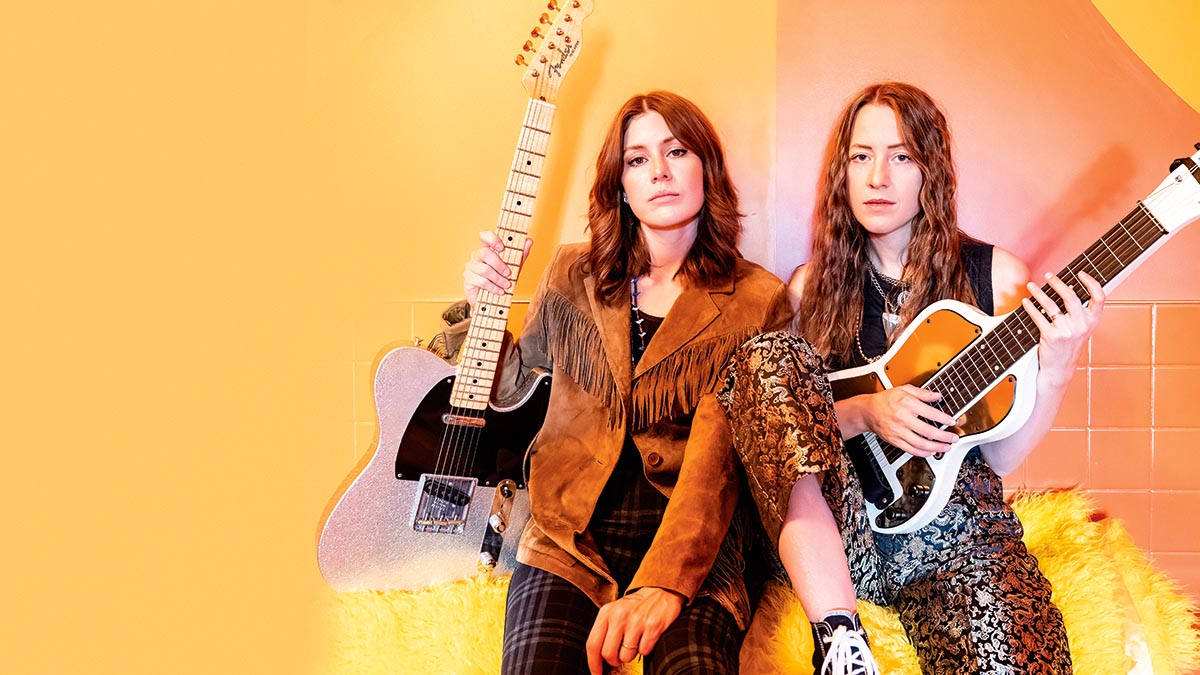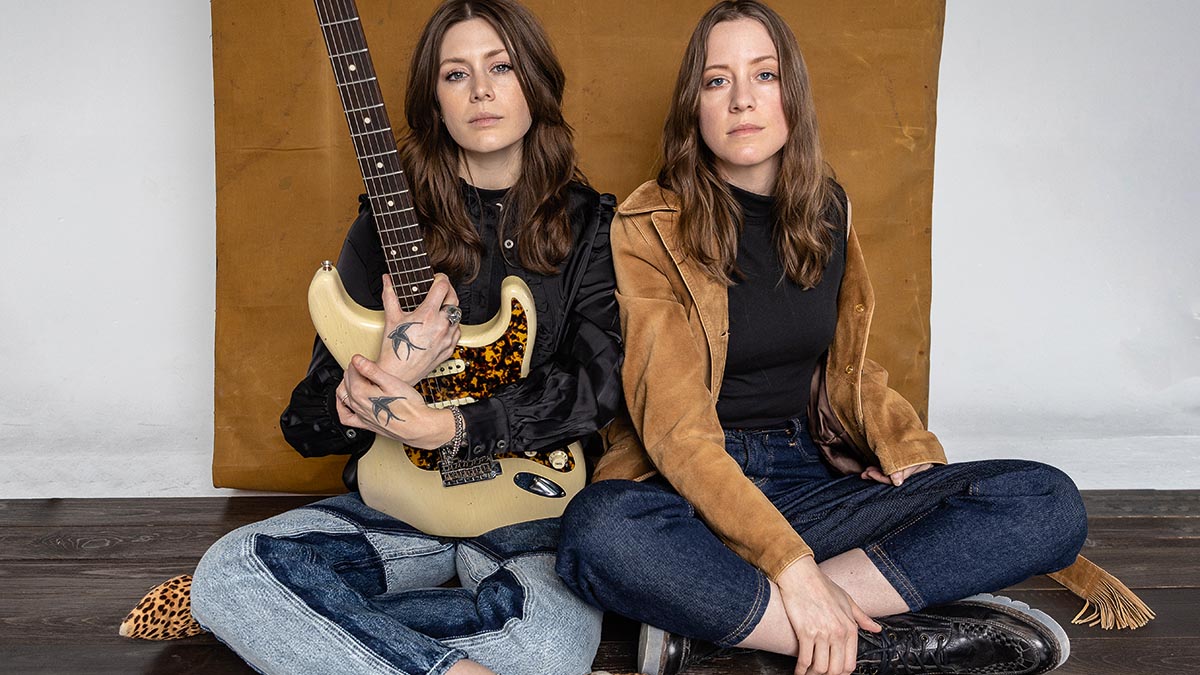Larkin Poe’s Megan and Rebecca Lovell on their pedalboard pinch-hitters, the voice of lap steel, and the blues as a living art form
The music of Larkin Poe is both deep-rooted and future-facing, but as the Lovell sisters tell us, there are no rules but one golden rule: “Every song has to have a riff!”

All the latest guitar news, interviews, lessons, reviews, deals and more, direct to your inbox!
You are now subscribed
Your newsletter sign-up was successful
Blues has always been a part of Larkin Poe’s roots rock ’n’ roll approach, but for new release Blood Harmony the blues element is unmissable. And it hasn’t happened by accident.
It’s the result of careful planning by the two sisters and multi-instrumentalists who lead the band, Rebecca and Megan Lovell – Rebecca the guitarist and lead singer, Megan the harmony vocalist and lap‑steel specialist.
“In making this album, I think the blues organically found its way into the writing process,” Rebecca says. “In the last six years, Megan and I have actively deepened our understanding of the blues.
“We’ve really tried to go back and with a student’s energy study the artists that have come before and figure out how to authentically incorporate blues stylings into what we do. That’s been by learning tunes by Skip James and Muddy and B.B., really trying to walk the walk. I’m really proud of this album. I think it coalesces a lot of our loves into a single thing.”
As the sisters told Total Guitar last year, Larkin Poe found their sound by arranging cover versions in their own style, and early blues was central from the beginning. Their breakthrough came with a version of a Son House classic from 1930.
“Preaching Blues was one of the one of the first blues covers we ever learned and it also was the first video that ever went viral for us, so it did feel like there was a connection there,” Megan recalls.
“It was a very authentic thing that we just kind of stumbled into. Since then we’ve really delved deeper in picking up blues songs and kind of bringing them into this century, having a deep respect for those who have come before and created the foundation of all of rock ’n’ roll. We have a great respect for the music but don’t shy away from changing it to fit us, because it should be a living art form.”
All the latest guitar news, interviews, lessons, reviews, deals and more, direct to your inbox!
I really I did write Bad Spell as a response to I Put A Spell On You, where it’s a bit swaggy, it obliquely threatens violence, and has this kinetic energy
Rebecca Lovell
That synthesis of early blues and the Lovells’ own personality brings us to the new album’s first single, Bad Spell. Driven by an irresistible grind, it’s an unabashed homage to a vintage blues standard.
As Rebecca admits: “They’re completely different songs in terms of the feel and the vocal performance, but Screamin’ Jay Hawkins’ I Put A Spell On You was the direct inspiration. Even just having ‘spell’ in the title, I was like, ‘We’re gonna skate pretty close to the edge here,’ but I really I did write Bad Spell as a response to that type of song, where it’s a bit swaggy, it obliquely threatens violence, and has this kinetic energy.
“So I piggybacked on that, and I think that is our way in which we engage with keeping the blues alive. I’m gonna learn the form and then I’m gonna free myself to colour outside the lines and trust that people are gonna come along with us.”
The guitar tone in Bad Spell also marks new territory for Larkin Poe, coming courtesy of the Beetronics Royal Jelly overdrive/fuzz blender. “It is such a cool pedal,’ Rebecca says. “It’s really versatile and there’s a range of tonal control that’s really fun.”
Bad Spell sees Larkin Poe rocking as hard as they ever have, a direction they can afford having cultivated an audience that expects diversity.
“We started calling ourselves ‘roots rock ’n’ roll’ around the time that we started our own record label,” Rebecca explains. “We embraced the biggest umbrella that we could in order to allow ourselves the most freedom, and I think that people have been really supportive of that.”

Creating roots music can be a minefield: too derivative and you’re dismissed as a tribute act, too original and you’re accused of betraying the genre. It’s a fine line that Larkin Poe tread admirably, digging into history without being restrained by it. Rebecca says it’s a lesson they learned in a previous life as session musicians.
“When we were touring with Elvis Costello, we were eating lunch and he was expounding on the importance of not putting yourself in a box. He is the perfect example of an artist who has had an incredibly diverse career.
“He does whatever he wants to do and the thread that connects it all is that it’s Elvis Costello. He was telling us, ‘People will try to attach specific genre tags to you. Keep them guessing. Just go where your heart tells you to go. Let your fans trust that you’re going to curate something that they will love regardless of genre.’”
There is another thread that connects the songs on Blood Harmony, as Megan observes: “Every song has to have a riff! We are crazy about riffs! And we wanted to write songs that could stand alone, that didn’t need production in order to be played. We didn’t really produce as we went along; we didn’t lay down parts and then layer as we were writing. If they worked with just the two of us, they went on to the next step.”
Larkin Poe’s sound is defined by Rebecca’s voice and Megan’s lap steel, and on Blood Harmony, both turn in some of their most emotional performances yet.
When Derek Trucks is playing it almost sounds like an opera singer to me
Megan Lovell
As Megan says, “It’s been a work in progress for many years to figure out how Rebecca and I really sing together, and now I mean sing as far as her vocal and my lap steel meshing together. It’s something that happens very naturally now we know how to intertwine our ranges. I stay out of her way.
“It’s a really fun puzzle to figure out because lap-steel is such a vocal instrument. I think the tone of my lap-steel does feel at times like a vocal or even like a cello. When Derek Trucks is playing it almost sounds like an opera singer to me. I think that’s why people connect with it so much, it’s such an emotional instrument.”
Emotion is the primary driver for Megan’s playing. “I always wanted to write riffs that feel like singing. I don’t care too much about shredding. I think it’s I think it’s amazing to hear people who are such technical players but I love to play very melodically and try and tap into the feeling behind what I’m playing.
“If I can take out the thought ‘Is this impressive enough? Is this technical enough? What are people thinking when they’re hearing my playing?’ If I can take all that thought out and just connect with an emotion, that’s when I feel happiest playing.”
Most Larkin Poe songs are written around riffs, but Blood Harmony saw the band shaking things up with last minute changes.
Rebecca: “You can sometimes get ‘demo-itis’. If you make a demo you can get stuck with ‘this is how the song should be’. We’ve been trying to challenge that in ourselves, letting the best ideas win and embracing the adage that writing is rewriting.
“You know, being able to dig back into the framework of a song and try to make each element better. Trying not to be precious about your ideas. On Kick The Blues, Megan came into the studio one morning like, ‘All right, roll me! I wrote a new riff for it.’ I was like, ‘Oh! Cool... let’s go!’ And the riff is so badass.”
Megan interrupts, laughing: “Admit it, you hated it at first didn’t you?”
Rebecca thinks for a moment. “I didn’t hate it, no, but it’s still really uncomfortable to listen to because it was so blindsiding. I was used to hearing it a different way and I loved that. It was really a great exercise to listen with open ears and letting it hit you afresh.”
Album opener Deep Stays Down was another song that was reinvented thanks to a last-minute riff from Megan. “I think the riff is really hypnotic,” Rebecca enthuses. “It’s just Megan on her little 1920s or 30s National lap steel. We were wrestling with that for weeks.
“We went through probably five different iterations of arranging that song, where it was like a hoedown and then it was a cinematic slow, spacey moment. We couldn’t quite get it to sink into what it was supposed to be until Megan started playing that riff.”

If reimagining a song as everything from a hootenanny to a film soundtrack sounds like fun, it should.
“Creative tension exists when you’re trying to make something and you don’t know,” Rebecca says. “The unknowing creates a lot of stress. You have to find ways to try and dispel the pressure. You want people to like the song. We have a finite amount of time on this Earth and we need to make a difference, come on dammit! All this stuff starts to tornado itself into ‘Oh my god, what are we doing?’”
We have a finite amount of time on this Earth and we need to make a difference, come on dammit! All this stuff starts to tornado itself into ‘Oh my god, what are we doing?
Rebecca Lovell
She reconsidered after watching the Beatles documentary Get Back: “Those guys were obviously serious, but the ways in which they were all goofy and they played with their music – they held it very lightly. That was a little bit of a revelatory moment. It can be hard keep that energy.
“It’s something that you have to learn, ‘We’re not gonna kill the joy out of this!’ Yes, this is how I make my living and yes there’s a lot of stuff riding on this, but being playful ultimately means there is more room for it to fully blossom. We want records that are authentic, unique, quirky and human.”
Megan credits their co-producer Tyler Bryant – Rebecca’s husband – with helping the sisters keep things light. “It was fun to have that energy in the studio. Rebecca and I have such a non-verbal communication and we can be very serious. It was great to have that third person in the room who is full of energy and very playful. It was really fun to experience more of that, ‘This might be weird but let’s try it!’”
Tracking at Tyler and Rebecca’s home studio also helped to relieve the pressure. “The studio can be an intimidating place when you’re stepping up in front of the mic and you want to be great,” Rebecca confesses. “Sometimes you’re not great and it’s okay to not be great. I think having our home studio vibes where it just felt like an extension of our home and we were able to be vulnerable and be kind of crappy and have it not matter as much, that was a really great facilitating angle for us to tap into something a bit more authentic and true.”
Bryant also introduced a staple of the Lovell’s guitar tone, his signature overdrive pedal: the Rodenberg TB Drive Shakedown Special. It’s essentially two Screamer-style drives in one box, one with a gain boost and both with switchable bass boosts.
“It’s a great pedal!” both sisters say at once. Their pedalboards had another new addition. “What’s that really crazy pedal we used?” asks Megan. Rebecca lights up.
“Oh, bro! The [Gamechanger Audio] Light Pedal. It’s three springs that are hit with light to make the springs vibrate. It creates these otherworldly weird reverb artifacts that will spiral and spiral. On the song Lips As Cold As Diamond, that’s what Megan is using for a lot of the howling, ‘verbed-out lap steel.”
Rebecca brought in a 1969 Gibson SG for some songs, but otherwise their rigs remain unchanged: Rebecca’s Strats and Megan’s Rickenbacker lap steel go through Fender Deluxe Reverb and Bassman guitar amps.
Megan, though, ends by casually dropping an exclusive new gear announcement: “I played my old Rickenbacker all over the record and I love touring with it. It has a unique holder so that I can stand and play it. I have been having some back issues because it’s really heavy, so I wanted to come up with a lap steel that was meant for standing.
“I worked with Beard Guitars and we have a new lap steel coming out that’s called the Electro-liege. It’s going to be announced very, very soon. It sounds a lot like a Rickenbacker. It’s got a Lollar horseshoe pickup in it, and it sounds beautiful. It’s very light and it looks cool, too!”
- Blood Harmony is out now via Tricki-Woo.
Jenna writes for Total Guitar and Guitar World, and is the former classic rock columnist for Guitar Techniques. She studied with Guthrie Govan at BIMM, and has taught guitar for 15 years. She's toured in 10 countries and played on a Top 10 album (in Sweden).

